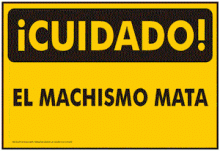According to the dictionary, the definition of machismo is a strong or exaggerated sense of manliness; an assumptive attitude that virility, courage, strength, and entitlement to dominate are attributes or concomitants of masculinity. So my question is how did this word come about?
There is this saying “machos are not born; they are created.” If this is true, then the term machismo refers to a concept that has been invented and not to an ancient cultural trait of any particular group of people. However, U.S. scholars and feminists noticed gender oppression in Mexico and other Latin American countries and announced that machismo was a particular cultural trait among Spanish-speaking men. There was also a disagreement with the origin of the word. Some believed it had ancient roots common in all Latin cultures since Roman times, others thought it was an ideology that originated in Andalusia, Spain, and was carried over the Atlantic Ocean during the Spanish Conquest. And then there were those who thought machismo was indigenous to the pre-Columbian Americas. In fact, the word machismo has only been around only a few decades in the twentieth century.
A troubling fact about the idea of machismo is that until recently the term was more widely used in the United States than many parts in Latin America. In other parts of the world, macho has always had a negative connotation when referring to humans. Macho originates from a term that designates the male of an animal species, but in Latin America the term has taken on a different meaning. It was not until the 1990’s that the term cam into fashion and was used widely throughout Latin America. In the contemporary United States, the machismo mystique is regularly used to imply that somehow Spanish-speaking heterosexual men are more prone than men from other cultural backgrounds to sexist language, actions, and relationships.
In Latin America, the term macho usually must be differentiated from that of machismo. Macho has different meanings in different social circumstances; it can refer to the male of a species, whether animal or plant. In other cultural contexts, “to be macho” can have contradictory connotations. For older generations, it can refer to something positive for men to emulate; in other words, “a macho man” is one who is responsible for the financial welfare of his family. On the other hand, for younger men it refers to culturally stigmatized behavior like beating one’s wife. Therefore, men from the younger generations refrain from calling themselves macho.
In my opinion, machismo is becoming less evident in the United States as Latinas go on to have a higher education and become independent of men. However, Mexico still has some progress to make. Even though it is quickly becoming a modernized country, it still tightly holds onto some traditional views.
References:
http://dictionary.reference.com/browse/machismo
http://science.jrank.org/pages/7838/Machismo.html
